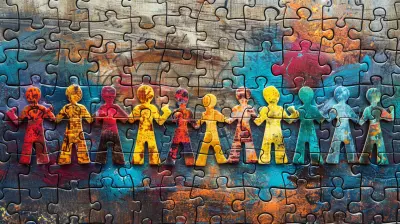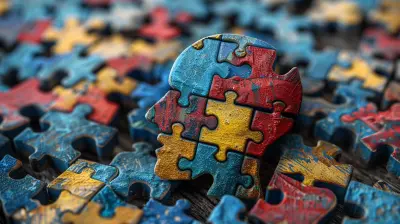4 February 2025
Emotions are a fundamental part of the human experience. They shape our behaviors, guide our decisions, and enable us to connect with others on a deep, personal level. Yet, for many men, expressing emotions can feel like trying to speak a language they’ve never been taught. But why is that? Why do men, in particular, struggle with emotional expression? And more importantly, how can we break the cycle?
In this article, we’ll dive into the underlying reasons behind men’s emotional challenges and explore actionable ways to foster healthier emotional expression. Let’s dig in!

Understanding the Emotional Struggle: Why Do Men Find It Hard to Express Emotions?
1. Cultural Conditioning: The "Man Box" Problem
From an early age, many boys are taught that “real men” don’t cry, show weakness, or express vulnerability. This cultural expectation is often referred to as the "Man Box"—a rigid set of beliefs about masculinity that confines men to a narrow emotional range. Society teaches young boys that anger and aggression are acceptable, but sadness, fear, or even joy (if it's too tender) are off-limits.It’s not that men are incapable of feeling emotions; rather, they’ve been conditioned to suppress them. They learn to bottle up their feelings to fit societal ideals of masculinity. This creates a vicious cycle where men feel ashamed of their emotions, leading to emotional repression and, in many cases, mental health struggles.
2. Fear of Judgment and Stigma
Let’s face it: there's still a stigma surrounding men who openly express their emotions. Many men fear they’ll be seen as weak, unmanly, or "less of a man" if they show vulnerability. This fear of judgment can make men hesitant to open up, even to those closest to them.Think about it—how many times have you heard phrases like “Man up,” “Stop being so sensitive,” or “Boys don’t cry”? These expressions, though often said in jest, carry a heavy weight. They reinforce the idea that expressing emotions makes men appear weak, which prevents them from seeking help or sharing their feelings.
3. Lack of Emotional Education
Another reason men struggle with emotional expression is that they simply haven't been taught how to do it. Unlike physical or intellectual skills, emotional intelligence isn’t always emphasized in childhood education. While some boys may receive guidance on how to throw a ball or solve math problems, learning how to identify and communicate emotions often takes a backseat.Without the appropriate education or role models, many men find it difficult to navigate the emotional landscape. They may not have the vocabulary to describe their feelings or the tools to process them in a healthy way.
4. Biological Factors: Brain Wiring
Though culture plays a significant role, there are also biological differences in how men and women process emotions. Research suggests that men tend to have less activity in the areas of the brain responsible for processing emotions, such as the amygdala. This doesn't mean men can't feel emotions deeply—it just means they may process them differently and perhaps more slowly than women.Additionally, testosterone, the male sex hormone, has been linked to increased aggression and reduced emotional sensitivity. While biology isn’t destiny, it can influence how men experience and express emotions.

The Impact of Emotional Repression on Men’s Mental Health
Emotional repression isn’t just a minor inconvenience—it can have serious consequences for men’s mental health and well-being. Here are some ways emotional suppression takes a toll:1. Increased Stress and Anxiety
When emotions are bottled up, they don’t just disappear. Instead, they fester, building up internal tension that can lead to chronic stress and anxiety. Imagine shaking up a soda bottle and leaving the cap on—the pressure inside continues to grow until, eventually, it explodes. The same thing happens with emotions. Men who suppress their feelings often experience higher levels of stress and anxiety because they aren’t allowing themselves an outlet.2. Higher Risk of Depression
Men who struggle with emotional expression are also at a higher risk of depression. Depression in men often presents differently than in women. Instead of sadness, men may feel irritable, angry, or numb. Since men are less likely to seek help for their emotional struggles, they often suffer in silence, leading to prolonged periods of mental health decline.3. Difficulty in Relationships
Emotional expression plays a crucial role in building and maintaining healthy relationships. When men repress their feelings, it can create communication barriers between them and their partners, friends, or family members. The inability to express emotions can lead to misunderstandings, resentment, and emotional distance in relationships.4. Physical Health Problems
Believe it or not, suppressing emotions can even take a toll on physical health. Studies have shown that emotional repression is linked to a range of physical ailments, including high blood pressure, heart disease, and weakened immune function. The mind and body are deeply connected, and when emotional health suffers, physical health often follows suit.
Breaking the Cycle: How Men Can Learn to Express Emotions
So, how can men break the cycle of emotional suppression and begin expressing their feelings more openly? It’s not an overnight process, but with effort and the right strategies, men can learn to embrace their emotional selves. Here are some practical steps:1. Challenge Cultural Norms and Re-Define Masculinity
The first step in breaking the cycle is challenging the cultural norms that equate emotional repression with masculinity. Men need to understand that strength isn't about hiding emotions—it's about having the courage to face them. Vulnerability is not a sign of weakness; it’s a sign of authenticity and emotional maturity.By re-defining what it means to be a man, we can create a new narrative where emotional expression is seen as a valuable and necessary part of life. Men can be strong, resilient, and emotionally expressive all at the same time.
2. Develop Emotional Literacy
Just like learning a new language, men need to develop emotional literacy—the ability to recognize, label, and communicate their emotions. This can be done through self-reflection, journaling, or even talking about emotions with a trusted friend or therapist. At first, it might feel awkward or uncomfortable, but practice makes perfect.Here’s a tip: Start small. Instead of jumping straight into deep emotional conversations, begin by identifying basic emotions like happiness, sadness, anger, or frustration. Once you become more comfortable with these, you can move on to more complex emotions like guilt, shame, or anxiety.
3. Seek Support from Trusted Individuals
Breaking the cycle of emotional repression isn’t something men have to do alone. Having a supportive network can make all the difference. Whether it’s a close friend, partner, or therapist, talking openly with someone you trust can help create a safe space for emotional expression.Remember, it’s okay to ask for help. Seeking support doesn’t make you less of a man—in fact, it shows emotional strength and self-awareness.
4. Practice Mindfulness and Meditation
Mindfulness and meditation can be powerful tools for emotional regulation. These practices help men become more aware of their emotions in the present moment without judgment. Instead of reacting impulsively or suppressing feelings, mindfulness teaches men to observe their emotions with curiosity and compassion.Over time, mindfulness can help men become more in tune with their emotional experiences and develop healthier ways of expressing them.
5. Engage in Creative Outlets
For some men, traditional talk therapy may feel intimidating or uncomfortable. In these cases, creative outlets like art, music, or sports can offer alternative ways to express emotions. Sometimes, words aren’t enough to convey what we’re feeling, and that’s okay. Engaging in creative activities can provide an emotional release and foster self-expression without the need for verbal communication.6. Encourage Emotional Conversations with Peers
If you’re a man looking to break the cycle, one of the most impactful things you can do is encourage emotional conversations among your peers. Men’s mental health often improves when they feel they’re not alone in their struggles. By sharing your experiences and encouraging others to do the same, you can help create a supportive environment where emotional expression is normalized and embraced.
Final Thoughts: It’s Time to Break the Cycle
The struggle with emotional expression is real, but it’s not insurmountable. By challenging outdated cultural norms, developing emotional literacy, and seeking support, men can begin to break free from the cycle of emotional repression. It takes time, patience, and a willingness to grow, but the rewards are well worth it.Remember, emotions aren’t the enemy—they’re a crucial part of what makes us human. The sooner men learn to embrace their emotions, the sooner they can experience deeper connections, better mental health, and a more authentic version of themselves.







Valentina Kim
Great insights! Understanding these challenges is crucial for fostering emotional health.
April 4, 2025 at 3:46 PM